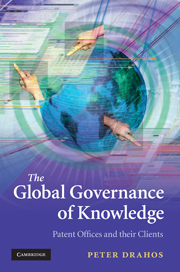Book contents
- Frontmatter
- Contents
- List of diagrams and tables
- List of abbreviations
- Preface
- 1 Patent offices and the global governance of knowledge
- 2 Labyrinths and catacombs: Patent office procedure
- 3 The rise of patent offices
- 4 The Sun and its planets: The European Patent Office and national offices
- 5 The USPTO and JPO
- 6 The age of Trilaterals and the spirit of cooperation
- 7 The jewel in the crown: India's Patent Office
- 8 The dragon and the tiger: China and South Korea
- 9 Joining the patent office conga line: Brazil
- 10 Islands and regions in the patent stream
- 11 Reclaiming the patent social contract
- 12 Patent administration sovereignty: Nodal solutions for small countries, developing countries
- Index
Preface
Published online by Cambridge University Press: 03 May 2010
- Frontmatter
- Contents
- List of diagrams and tables
- List of abbreviations
- Preface
- 1 Patent offices and the global governance of knowledge
- 2 Labyrinths and catacombs: Patent office procedure
- 3 The rise of patent offices
- 4 The Sun and its planets: The European Patent Office and national offices
- 5 The USPTO and JPO
- 6 The age of Trilaterals and the spirit of cooperation
- 7 The jewel in the crown: India's Patent Office
- 8 The dragon and the tiger: China and South Korea
- 9 Joining the patent office conga line: Brazil
- 10 Islands and regions in the patent stream
- 11 Reclaiming the patent social contract
- 12 Patent administration sovereignty: Nodal solutions for small countries, developing countries
- Index
Summary
Patent office administration would strike many a person as a dull topic. In fact this is wrong, for it is an excruciatingly dull topic. Yet like many such technical topics it explains why our world is the way that it is. States need tax bureaucracies to collect taxes, otherwise they would not last long as states. Multinationals need patent offices to grant patents, otherwise they could not raise private taxes. They would have to find other ways in which to gain monopolies over medicines, chemicals, seeds and software.
The importance of the topic, along with the realization that patent offices had largely been neglected in the regulatory literature, led me to undertake the study. My focus was not on one office in particular but rather on the interaction amongst patent offices and in particular between developed and developing-country patent offices. The development effects of intellectual property rights have become a major area of study, but we do not know much about how developing-country patent offices administer the standards of patentability that arrive in their countries through various treaty processes.
Administering a patent system is one of the few areas of intellectual property over which developing countries have considerable sovereign discretion. Patent offices might be one place in which one might find developing-country resistance to the hegemony that the US, EU and Japan exercise over patent standard-setting processes.
- Type
- Chapter
- Information
- The Global Governance of KnowledgePatent Offices and their Clients, pp. xiv - xviPublisher: Cambridge University PressPrint publication year: 2010



